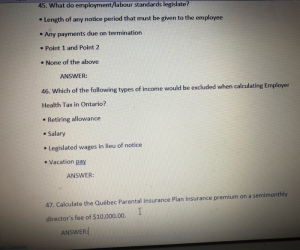What Is Termination Pay Due?
Termination Pay Due
When is termination pay due? This question may be the first question an employee must ask when laid off from their job. Understanding the laws that govern this payment and the employer’s rights can help any laid off employee understand their rights better.
Employment law states that when is termination pay due is generally when an employee is terminated without just cause. In other words, there has to be some kind of legitimate reason for the termination. At a bare minimum, terminated employees must receive exit pay equal to their regular weekly wage plus the portion of their predetermined weekly benefit that is based on the state’s payment schedule. If an employee’s wages vary from one week to another, terminated pay is the weekly average of the individual’s wages for the past 13 weeks preceding the date of termination. There are some exceptions to these laws which include certain medical benefits and disability insurance.
The amount of this pay varies from state to state. The first step you should take is to contact your state’s workers compensation board or your local division of labor. They will be able to tell you the precise rules and regulations that govern this type of payment in your specific state. You must always contact your employer before demanding this payment because there are serious repercussions for refusing to give it to the employees.

What Is Termination Pay Due?
An employer is required to pay workers compensation when there is a physical termination. However, there are some circumstances that do not classify as physical termination for this particular regulation. For example, if an employer terminates an employee for improper performance, but it turns out that the performance was actually qualified and proper, then there is no need to pay the employee. This is also true if an employee is terminated for cause. However, an employer must make sure that their employee understands what will happen when they receive the termination notice.
In most states, when is termination pay due depends on the type of service rendered. The two most common forms are per diem and salary. In both situations, the employer must make the payment directly to the insurer. However, if the employment contract includes a clause that states the employer is responsible for workers’ compensation, then the employer severance pay is required to send a check for this particular fee directly to the insurer. When an employee receives this notice, they must then file a complaint with their agency within a specific time period.
Another important factor that must be addressed when is termination pay due is whether or not the worker is entitled to compensation for damages to personal property. Some states have ruled out damages as a matter of law, while others have addressed the issue on a case by case basis. It is important that you work with a qualified attorney to address this issue. If not, an employee may not have a case against their former employer. The best course of action is to consult with an attorney who has experience in these types of cases.